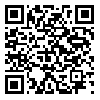دوره 22، شماره 1 - ( 1-1403 )
جلد 22 شماره 1 صفحات 138-129 |
برگشت به فهرست نسخه ها
Download citation:
BibTeX | RIS | EndNote | Medlars | ProCite | Reference Manager | RefWorks
Send citation to:



BibTeX | RIS | EndNote | Medlars | ProCite | Reference Manager | RefWorks
Send citation to:
Khabbache H, Ouazizi K, Ait Ali D, Cherqui A, Rizzo A, Tarchi L, et al . Cultural Placebos From the Wild in Patients With Mental Disorders: The Case of the Nour Association in Fez-Morocco. Iranian Rehabilitation Journal 2024; 22 (1) :129-138
URL: http://irj.uswr.ac.ir/article-1-2204-fa.html
URL: http://irj.uswr.ac.ir/article-1-2204-fa.html
Cultural Placebos From the Wild in Patients With Mental Disorders: The Case of the Nour Association in Fez-Morocco. مجله انگلیسی زبان توانبخشی. 1403; 22 (1) :129-138
چکیده: (2977 مشاهده)
Objectives: In urgent situations, like those experienced by the Nour Association, individuals often turn to their ethnocultural backgrounds and ingrained coping mechanisms to enhance their psychological and overall well-being.
Methods: This study employed a dual-analytical approach. Initially, participant observation was used to understand the day-to-day activities within the Nour Center’s authentic environment. Subsequently, three cognitive theories—conceptual metaphor, schema, and frame theory were applied to analyze and interpret the transformation in the patients’ conceptual systems comprehensively.
Results: We detected that the patient community at the Nour Center utilized various socio-cultural practices (drama roleplay, peer-support therapy, and task-shifting) to create an improvised, theory-independent recovery program focused on ‘awakening’ and ‘self-empowerment’. These latter were mediated by higher-order meta-cognitive processes, such as ‘self-regulation’ and ‘self-description’, frames, such as ‘the home frame’ and ‘the hospital frame’, and schemata, such as ‘the function schema’, which are foundational to ‘cultural placebos’.
Discussion: The present findings established that both general health and mental health are significantly shaped by societal influences, indicating that cultural therapy emerges from the intricate dynamics of sub-cultural social systems. Ultimately, concepts of illness and recovery are subject to cultural negotiation.
Methods: This study employed a dual-analytical approach. Initially, participant observation was used to understand the day-to-day activities within the Nour Center’s authentic environment. Subsequently, three cognitive theories—conceptual metaphor, schema, and frame theory were applied to analyze and interpret the transformation in the patients’ conceptual systems comprehensively.
Results: We detected that the patient community at the Nour Center utilized various socio-cultural practices (drama roleplay, peer-support therapy, and task-shifting) to create an improvised, theory-independent recovery program focused on ‘awakening’ and ‘self-empowerment’. These latter were mediated by higher-order meta-cognitive processes, such as ‘self-regulation’ and ‘self-description’, frames, such as ‘the home frame’ and ‘the hospital frame’, and schemata, such as ‘the function schema’, which are foundational to ‘cultural placebos’.
Discussion: The present findings established that both general health and mental health are significantly shaped by societal influences, indicating that cultural therapy emerges from the intricate dynamics of sub-cultural social systems. Ultimately, concepts of illness and recovery are subject to cultural negotiation.
نوع مقاله: پژوهشي |
موضوع مقاله:
روانشناسی
دریافت: 1402/10/27 | پذیرش: 1402/11/19 | انتشار: 1402/12/11
دریافت: 1402/10/27 | پذیرش: 1402/11/19 | انتشار: 1402/12/11





